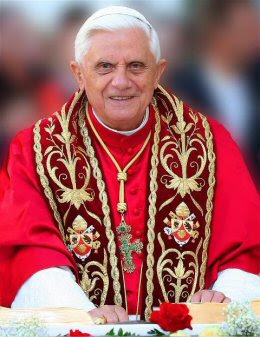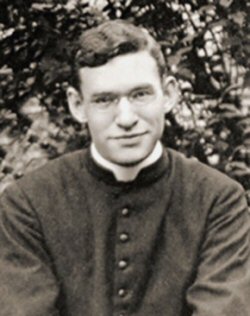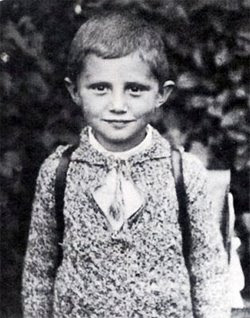
There are two great articles (among others) in this months issue of Crisis Magazine. This will be the last printed issue as they will be going to an online only format starting next month. The good news is that they will expand the magazine and there will be no subscription fee.
Both of the following articles touch on issues related to vocations. They are definitely worth taking the time to read.
- an excerpt from this article...
Hello, Good Men
In what is certainly a corollary to Christian manhood’s renaissance in family life and among young men, we have also begun to witness a discernible return to masculinity in our seminaries and, consequently, our parishes. Both Monsignor Swetland and his confrere Msgr. Steven Rohlfs, rector for the Mount, see promising signs in the men coming through their seminary doors today.
For one, they are carrying themselves differently: “They take pride in their masculine attributes,” says Monsignor Swetland. “The last couple generations of priests generally weren’t too concerned about taking care of themselves physically,” but these days “they work out, they play sports, they want to look and dress and act like men.” Also in contrast to their predecessors, they’re interested in pursuing “a distinctly masculine spirituality,” says Monsignor Rohlfs—in part, he adds with a laugh, because “there’s a sense of relief that it’s now acceptable to talk that way.”
This didn’t happen by accident, of course. Good seminaries are not simply enjoying a serendipitous influx of manlier applicants; they’re expressly targeting them. In what ought instantly to become the mantra of every rector and vocations director in the country, Monsignor Rohlfs tells how he seeks candidates who “exude a personality of quiet confidence and strength”; who demonstrate “an ability to relate to men and to fathers of families, as well as to children as a spiritual father”; and finally, “a spirituality that brings together the best qualities of a man.”
Those qualities exceed the external trappings of speech and physique. “We’re addressing what it means to talk about ‘maleness,’ beyond just the body,” says Monsignor Swetland. Seminarians who, a generation ago, might have been “knocked down for appearing too aggressive” are now confident in showing initiative—no longer bound by “a false sense of what it means to be pastoral,” these men are “not afraid to be Christ-centered men of action,” not afraid to preach boldly about “God’s ferociousness of heart.”
The change has begun to bear evident fruits in the interactions among younger clergy and seminarians, thanks to a reemphasis on the classical sense of friendship, which helps guard against same-sex attraction while building a lifelong foundation for priestly fellowship and mutual help. Among such men there is virtually no evidence of the affectation of feminine traits and roles that has plagued many seminaries. And the conversations at support groups, Monsignor Swetland adds, “aren’t all psychobabble like they used to be.” Instead, the young men challenge and demand accountability of each other.
Perhaps above all else, this new breed of seminarian has a fundamentally different orientation toward the Church, a posture that is decidedly husbandly. “The priests we’re forming now,” says Monsignor Swetland, “their mission is to love, cherish, and protect their Bride the Church. Whereas so many priests and seminarians of my generation, they wanted to change the Church.” This doesn’t mean that these men are blind to the Church’s faults and failings; however, they view those troubles in the larger context of a “battle to fight on her behalf.” This spirit of spousal fidelity, combined with a healthy accent on God’s transcendence (whereas the feminine approach, Monsignor Rohlfs muses, “tends to accentuate His immanence”), has the added effect of sealing these young priests with a deep and trustworthy orthodoxy.
Despite positive signs, this part of the “battle,” such as it is, remains far from won. In many seminaries, even those that have cleared their staffs of ideologues, who before would give unabashed preference to effeminate candidates while straining out the masculine ones, there are still future priests with a seriously deficient—or skewed—sense of what it means to be a man. Some of these will become deadbeat spiritual fathers; others will have to battle—or will succumb to—homosexual urges. Interestingly, some of these seminarians are the same ones displaying a conspicuously fervent piety or orthodoxy. More than one source mentions the acronym DOT—“Daughter of Trent,” house slang for an effeminate or presumptively gay seminarian who affects (or adopts in a compensatory way) an old-school spirituality or flame-throwing orthodoxy. Nonetheless, there is a definite and promising trend here, the benefits of which we have just begun to reap in parishes nationwide.
In the Steps of St. Francis: How One Community Brought Renewal to Religious Life
This is yet another article about the Franciscan Friars of the Renewal - you can't buy this kind of publicity. It's unbelievable the free press they get, but hey, more power to them. The article has some great quotes about reform in the Church and in religious communities.
























No comments:
Post a Comment